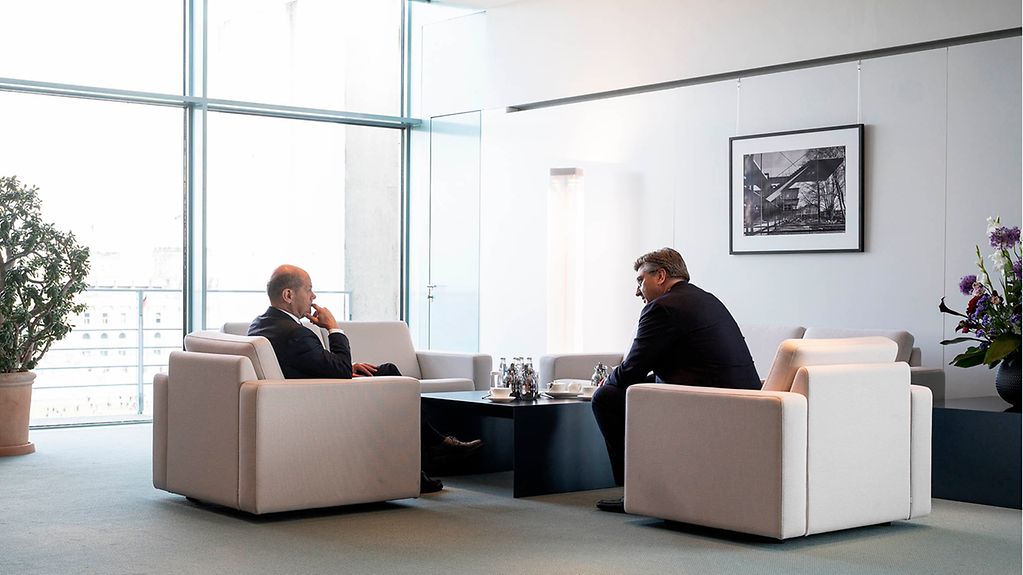Croatia's prime minister visits Federal Chancellor Scholz
“We cannot and will not put up with the fact that a war is being waged without mercy in Ukraine,” said Federal Chancellor Scholz during the visit of Prime Minster Plenković of Croatia. He praised the way Croatia had taken in many war refugees, describing it as “thriving solidarity within the EU.” He also welcomed the EU Commission’s decision on introducing the euro in Croatia.
2 min reading time

Federal Chancellor Scholz and Prime Minister Plenković reaffirmed the importance of a strong EU.
Photo: Federal Government/Bergmann
When Prime Minister Andrej Plenković of Croatia visited the Chancellery in Berlin on Wednesday, Federal Chancellor Scholz acknowledged the 400,000 people living in Germany who have Croatian roots. In addition he stressed the close links between Croatia and Germany through their memberships of NATO and the European Union, and, just as importantly, between the citizens of the two countries.
The Federal Chancellor expressly welcomed the decision of the European Commission to give the go-ahead for Croatia to introduce the euro on 01 January 2023. Scholz stressed that this issue was particularly close to his heart, identifying it as a key step in progress towards a strong Europe.
Andrej Plenković was born in Zagreb in 1970. He has served as prime minister at the head of the Croatian government since 2016.
Over 100 days of war
A key issue at the meeting between the two leaders was Russia’s war of aggression against Ukraine, which has now been going on for over 100 days. The war “continues to preoccupy us. We cannot and will not put up with the fact that a war is being waged without mercy in Ukraine. This is a war for which the Russian president alone bears full responsibility,” Scholz stressed.
EU: new sanctions adopted
Scholz noted the importance of the new round of sanctions adopted by the EU at the most recent meeting of the European Council in Brussels in response to Russia’s war of aggression against Ukraine. “It is important that the EU stands together against the aggression and demonstrates to Russia the consequences of its actions, now with six tough packages of sanctions,” said the Federal Chancellor.
The Federal Chancellor also reaffirmed Germany’s ongoing support for Ukraine – “financial, humanitarian and also military support in the form of weapons systems and munitions.”
Refugees in Croatia: “thriving solidarity”
The Federal Chancellor praised the unprecedented solidarity shown by EU member states in taking in millions of refugees from Ukraine. On this point he expressed his particular thanks to Prime Minister Plenković that “Croatia has played its part in taking in such a large number of refugees. This is the thriving solidarity of the EU.”
Energy policy: limiting dependence on Russia
Scholz described how the talks had focused on energy policy, where he said the objective was clear: “reducing dependency on energy imports, keeping energy prices under control and combating climate change.”
Accelerating integration of Western Balkan countries
Alongside the war in Ukraine, the agenda included the future of the Western Balkans. “It is a matter of personal concern to me that talks on EU accession for the states of the Western Balkans should now start as soon as possible.
Federal Chancellor Scholz said that accession was in the interests of all, as it would strengthen the union and stabilise the Balkans. He said he therefore considered it important that the negotiations between the EU and Albania and Northern Macedonia should begin as soon as possible.